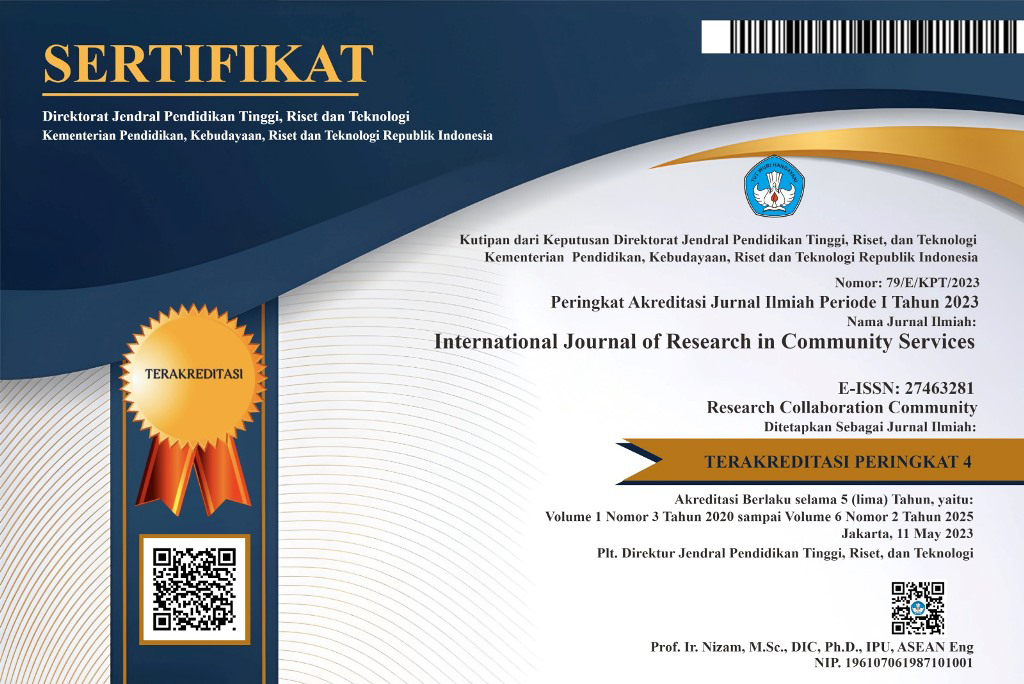Socialization of Organic and Inorganic Waste Segregation as a Form of Environmental Concern during the Covid-19 Pandemic in Public Elementary School (SDN)10 Ciamis, Indonesia
Abstract
Community Service is one of the Tri Dharma of Higher Education, especially at Garut University, it is hoped that with this community service the existence of universities can contribute to the development of scientific application to the community. Efforts to protect the surrounding environment must start from oneself by doing small things, educating students about environmental problems due to landfills is needed to raise students' awareness so that they are more concerned with the surrounding environment. Active participation of students can be done in a culture of disposing of waste in its place. However, because of the many categories of waste that exist, it is necessary to educate students about the types of waste, namely; organic, inorganic and B3 waste (hazardous and toxic materials) and their handling.This community service activity method uses the method of delivering socialization material with counseling techniques, questions and answers, quizzes, and by adding games. The results of the research carried out were able to make students leave the old way of just throwing garbage away, but also provide education and familiarize students to sort, select, and categorize waste as well as develop a waste bank so that it has economic value. If this is done, the practice of processing and utilizing waste becomes a real step in managing waste.
Full Text:
PDFReferences
Chakrabarti, S., Majumder, A., & Chakrabarti, S. (2009). Public-community participation in household waste management in India: An operational approach. Habitat International, 33(1), 125-130.
Derqui, B., & Fernandez, V. (2017). The opportunity of tracking food waste in school canteens: Guidelines for self-assessment. Waste management, 69, 431-444.
Dhokhikah, Y., Trihadiningrum, Y., & Sunaryo, S. (2015). Community participation in household solid waste reduction in Surabaya, Indonesia. Resources, Conservation and Recycling, 102, 153-162.
Grodzińska-Jurczak, M. (2003). The relation between education, knowledge and action for better waste management in Poland. Waste management & research, 21(1), 2-18.
Gusti, A. (2016). The relationship of knowledge, attitudes, and behavioral intentions of sustainable waste management on primary school students in city of Padang, Indonesia. International Journal of Applied Environmental Sciences, 11(5), 1323-1332.
Khalil, M., Berawi, M. A., Heryanto, R., & Rizalie, A. (2019). Waste to energy technology: The potential of sustainable biogas production from animal waste in Indonesia. Renewable and Sustainable Energy Reviews, 105, 323-331.
Kim, S. H., Kwak, T. K., Choi, E. H., & Lee, K. E. (2007). Food waste management practices and influencing factors at elementary school food services. Korean Journal of Community Nutrition, 12(6), 815-825.
Meidiana, C., & Gamse, T. (2010). Development of waste management practices in Indonesia. European journal of scientific research, 40(2), 199-210.
Moh, Y. (2017). Solid waste management transformation and future challenges of source separation and recycling practice in Malaysia. Resources, Conservation and Recycling, 116, 1-14.
Pandebesie, E. S., Indrihastuti, I., Wilujeng, S. A., & Warmadewanthi, I. D. A. A. (2019). Factors influencing community participation in the management of household electronic waste in West Surabaya, Indonesia. Environmental Science and Pollution Research, 26(27), 27930-27939.
Paul, J. G., Arce-Jaque, J., Ravena, N., & Villamor, S. P. (2012). Integration of the informal sector into municipal solid waste management in the Philippines–What does it need?. Waste Management, 32(11), 2018-2028.
Phan Hoang, T. T., & Kato, T. (2021). Measuring the impact of solid waste management workshop activities in elementary schools: a six-month case study in Da Nang city, Vietnam. Applied Environmental Education & Communication, 20(3), 238-255.
Posmaningsih, S., Aryasih, S. K. M., Made, I. G. A., Choirul Hadi, M., Marwati, S. P., & Mallongi, A. (2018). The influence of media booklet in behavior change of waste management in elementary school students, South Denpasar, Bali. Indian Journal of Public Health Research & Development, 9(8), 1506-1511.
Raharjo, S., Matsumoto, T., Ihsan, T., Rachman, I., & Gustin, L. (2017). Community-based solid waste bank program for municipal solid waste management improvement in Indonesia: a case study of Padang city. Journal of Material Cycles and Waste Management, 19(1), 201-212.
Ryu, G., Gwak, D. G., & Choe, E. H. (2001). Assessment of waste management practices, source-reduction programs and related tasks in elementary school foodservice in Seoul and Kyonggi province areas. Journal of the Korean Dietetic Association, 7(4), 410-425.
Sasaki, S., Araki, T., Tambunan, A. H., & Prasadja, H. (2014). Household income, living and working conditions of dumpsite waste pickers in Bantar Gebang: Toward integrated waste management in Indonesia. Resources, conservation and recycling, 89, 11-21.
Sekito, T., Prayogo, T. B., Dote, Y., Yoshitake, T., & Bagus, I. (2013). Influence of a community-based waste management system on people's behavior and waste reduction. Resources, Conservation and Recycling, 72, 84-90.
Singer, J., Kieu, K. T., & Pravitasari, A. E. (2019). Solid Waste Management in Tourist Destinations in Developing Nations: Case Studies in Hoi An, Vietnam, and Puncak, Indonesia. In Environmental Sustainability and Education for Waste Management (pp. 189-206). Springer, Singapore.
DOI: https://doi.org/10.46336/ijrcs.v2i4.227
Refbacks
- There are currently no refbacks.
Copyright (c) 2021 International Journal of Research in Community Services

This work is licensed under a Creative Commons Attribution 4.0 International License.
Published By:
IJRCS: Jalan Riung Ampuh No. 3, Riung Bandung, Kota Bandung 40295, Jawa Barat, Indonesia
Indexed By:

This work is licensed under a Creative Commons Attribution 4.0 International License.
View My Stats








